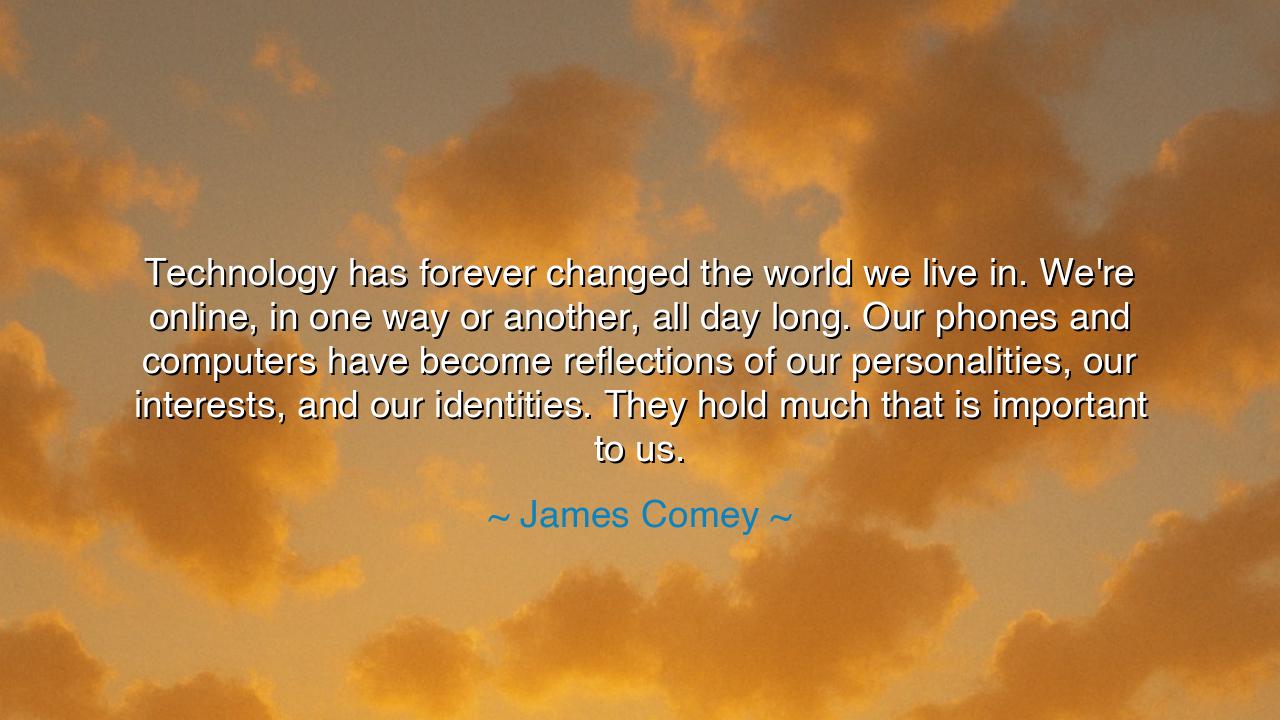
Technology has forever changed the world we live in. We're
Technology has forever changed the world we live in. We're online, in one way or another, all day long. Our phones and computers have become reflections of our personalities, our interests, and our identities. They hold much that is important to us.






"Technology has forever changed the world we live in. We're online, in one way or another, all day long. Our phones and computers have become reflections of our personalities, our interests, and our identities. They hold much that is important to us." – James Comey
In the grand sweep of history, there have always been inventions that shape the way we interact with the world and with each other. From the first wheel to the discovery of fire, each innovation has forever altered the course of human existence. Yet none has had such a profound and pervasive influence as technology in the modern age. James Comey’s words serve as a poignant reflection on the omnipresence of digital technology in our lives. Today, we live not just in a world shaped by technology, but in a world that has become inseparable from it. The phones and computers we carry are not mere tools—they are extensions of ourselves, encapsulating our personalities, our interests, and, in many ways, our very identities.
In the ancient world, people lived close to the earth, and their identities were shaped by nature, family, and community. The Greek philosopher Socrates often spoke of the importance of the inner life, the reflection on one's own soul. He encouraged his followers to look inward and seek truth through dialogue and reason, rather than through the external distractions of the world. Yet, in today’s world, technology has become a mirror that reflects not just our inner world but our external world as well. Just as the ancients had the oracle to divine their futures, so too do we have phones and computers to guide and shape our present. Comey’s observation calls attention to this transformation: technology has become the very fabric of our daily lives, a thread that weaves our actions, thoughts, and identities into the digital realm.
The ancient Romans understood the power of tools and systems to shape both individual lives and the course of empires. The Roman aqueducts, those magnificent feats of engineering, were not just practical devices but symbols of the empire’s power and organization. In much the same way, today’s technological systems—the phones and computers that keep us connected—serve as symbols of our modern empire. But unlike the Romans, whose empire was built on physical conquest, our empire is digital, built on information, communication, and connectivity. Our identities today are shaped by our interactions in this vast digital world, and just as the Romans were defined by their aqueducts and roads, so too are we defined by the screens we stare into each day.
Consider the printing press, invented by Johannes Gutenberg, which revolutionized the dissemination of knowledge and ideas in the 15th century. Before its invention, the spread of knowledge was limited to the elite few who could read and access manuscripts. After Gutenberg’s press, knowledge became accessible to the masses, and with it came a profound transformation of society. Similarly, the advent of digital technology—the internet, smartphones, and computers—has democratized information, allowing anyone with access to these tools to express their identities, share their ideas, and connect with others around the world. Like the printing press, technology has become a powerful force that shapes the world we live in, creating opportunities for both connection and division.
However, Comey’s insight also carries a cautionary tone. Just as the printing press spread knowledge, it also spread propaganda, misinformation, and division. Today, our digital identities—which hold so much of our personal and professional lives—are vulnerable to manipulation, misinformation, and surveillance. Technology may offer us a mirror into our identities, but it is also a lens through which we can be watched and influenced. The power we place in our devices must be tempered by a wisdom that understands the potential for misuse. The question, then, is not just how technology shapes us, but how we choose to shape it. Will we use it to further our understanding and connection, or will we let it define us in ways that strip us of our autonomy?
The lesson of Comey’s words is one of balance and self-awareness. Just as the ancients understood the need for personal reflection and the importance of guarding against external distractions, we must understand the profound influence that technology now has on our lives. While computers and phones can be instruments of empowerment and connection, they can also be tools of distraction and manipulation. The true challenge of our time is not simply to embrace these technologies, but to use them wisely and consciously, always aware of their power to shape not just our world, but our very selves.
Let us, then, take a moment to consider how we engage with the digital world. Are we simply letting the tide of technology carry us along, or are we consciously choosing how we want to shape our identities in this new age? Just as the ancients sought to balance reason with action, so too must we balance the digital tools at our disposal with a deep understanding of their impact on our inner lives. We are at a crossroads where technology has become inseparable from who we are, but we must not forget that we have the power to shape this relationship—not just to consume it, but to use it to reflect the highest ideals of human connection, creativity, and purpose.






AAdministratorAdministrator
Welcome, honored guests. Please leave a comment, we will respond soon